I need to shout this good news out of my system
and then we will keep talking about books and writing. P.S. Booking developmental editing for 2024 now; see announcement at bottom.
Housekeeping: If you are receiving this email for the first time you may have taken a recent class or inquired about coaching services. This email is sent about once per month. Feel free to unapologetically unsubscribe. In this newsletter-mad world, we all need that freedom!
I started to write to you today about a cool author interview I did with super-smart Happiness Falls author Angie Kim last week, and then I realized…I can’t do this. I can’t stick this at the end of a long newsletter or just assume you’ve read about this elsewhere. It’s too important. Possibly only to me—ha!
I…am…an…Ironman!
Yes. I mean, No! I mean yes and no!
Of course, I’m not Tony Stark, but boy, for a long day in late November I sure did feel like him.
Fun fact: Back when I was struggling through the sophomore novel blues (2008-2009), following the publication of my debut novel, The Spanish Bow, which was followed by two manuscripts about which my agent had no interest whatsoever, I remember going to see the original Iron Man movie. I decided that Tony Stark would be my secret inspiration—not in terms of what I was writing, because I was writing about 1800s archaeology at the time1, but in terms of how I saw my life and career playing out, which is to say, not easily or smoothly. But also: not conventionally. I did not want to be put into a box!2
But alas, the Ironman I am bragging about today is this one!
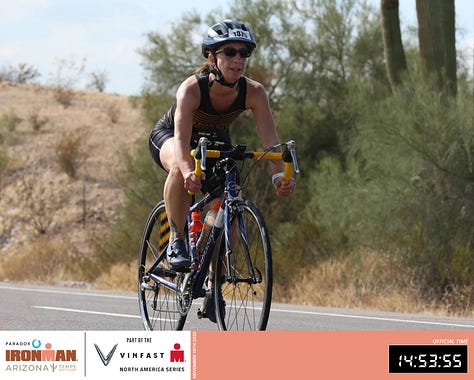
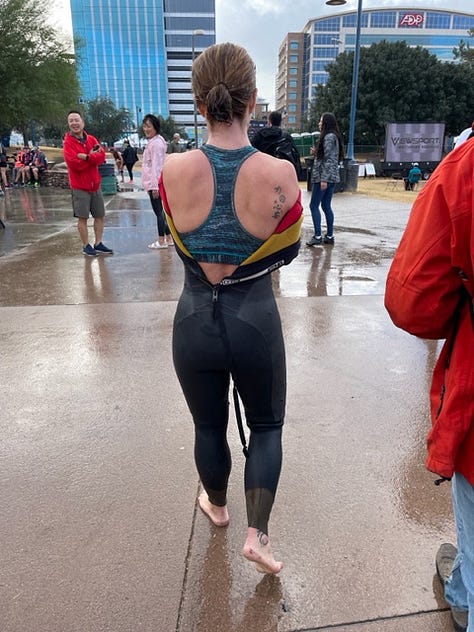
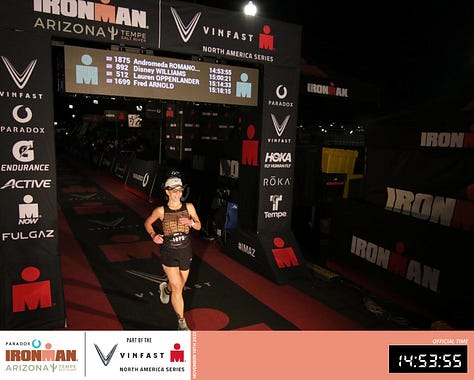
The day went ridiculously, illogically well.
I expected fear, doubt, pain, and at best a 70% chance of finishing in the maximum time allowed.
Instead, I not only finished two hours ahead of schedule, in the middle of my age group, but I also felt great the whole time, without any of the physical problems I worried about, like back pain or gut rebellion. The lack of mental problems was even more surprising. I not only performed beyond my expectations but more importantly, I stayed focused and in-the-moment. I was able to enjoy myself. I was able to look up and around, take mental snapshots, and remind myself, Savor this!
From the sparkling sunrise on the canal where two thousand athletes kicked and thrashed each other, to the desert valley where we cycled into fierce headwinds, to the long, dark night of the marathon, it was beautiful. It was challenging. It was emotionally moving, especially with the support of family, friends, and cheering strangers. It was once-in-a-lifetime-caliber fun!
I also had some giddy moments on the bike course, as my average speed remained two mph faster than I needed to finish on time, thinking, “If I can do this, I can do anything!”
Yes, some extreme endorphins were racing through my body. I felt like I could lift up a car! (Maybe I was channeling Tony Stark as Ironman).
But given the length of that all-day bike ride, without headphones or any kind of distraction, I also had lots of time to appreciate a simple truth: we can achieve anything, or nearly anything, if we prioritize it, break it down into steps, dedicate adequate resources, surround ourselves with support, and have the right mindset about obstacles and timing.
Want a longer version?
Here’s an excerpt from how I summed up race-day lessons, as they relate to writing, at the 49 Writers blog:
Incrementalism is everything. Even with a big goal, you have to focus on tiny steps. That’s true in training and even more true during the race itself. Thinking ahead to how much work it will take to write and publish a novel or learn to write a first screenplay (or swim, bike and run 140.6 combined miles) is overwhelming. You must learn to focus on what’s right in front of you. The next mile or the next fifty meters. The next paragraph or revised chapter or email to a prospective agent. Learning to Shrink Your World and Be Here Now (two of my most helpful mantras) is a skill. Practice and apply.
Dedicate adequate resources. I spent over $10,000 in race fees, travel expenses, gear, a bike fit, pool visits, chiropractor appointments, and much more. Someone reviewing our limited family budget would judge me foolhardy, especially when they saw all the normal, necessary things I couldn’t afford as a result. (My dentist, plumber, and car mechanic can all attest.) Now that the race is done and it was a blast and I feel the healthiest I’ve felt in years, the lesson is still sinking in—not that I overspent, but that I don’t spend enough or spend strategically when it comes to other major goals.
Early on my path to becoming a novelist, when I was a classic starving artist, subsisting on a freelance income, I splurged for writing retreats and conferences. But in some ways, I’ve started to backslide, fretting over things like minor conference fees. Now that I’ve done the Ironman, I actually think I should invest more in myself as writer. More DIY retreats to focus on writing. More networking trips. Whatever is required!
Reframing difficulty and embracing discomfort. For most of my triathlon training I assumed that if I just got fit enough, workouts would feel less hard. Only in my final months did I realize the task wasn’t eliminating discomfort (or doubt, pain, or resistance), it was making peace with it. Some things will always feel hard, but even pain can be separated from suffering. A bad review? A “pass” by a publisher? Those will hurt. But they don’t have to hurt deeply or for long.
Finding and accepting help. I tend to be solitary and overly independent. Triathlon forced me not to be. I needed advice from other athletes and coaches; I needed endless tolerance from family and friends; I even got over my squeamishness and fundraised 20% of my race costs. In your writing life, what kind of help could you leverage if you weren’t afraid to ask? Just as important, do you help others so that when your time of need comes, support will be available?
Interpreting and accepting setbacks. Two months before Ironman New Zealand, where I was supposed to race for the first time, I got COVID. It was a huge financial loss and a strategic setback. Physically, I started back at square one. I had to train another nine months, leading up to the Arizona Ironman. Looking back now, I realize I wasn’t even close to ready for that NZ race. It would have been a disaster. By the time Arizona rolled around, I was truly ready and…could it be?…not even all that nervous.
Have you ever experienced rejection related to a writing project? We all have. Is it just slightly possible that more time might lead you to write a much better draft, and someday you’ll look back and be glad that your early draft didn’t get published? Major setbacks don’t feel like a gift, but they can be, especially when we need more time to develop ourselves and our writing.
P.S. For those who are really interested in triathlon (a very small percentage of the population, admittedly), here is my longer race report at my Ironman newsletter, Unlikely. There you will also find fifteen other posts about my two-year-long journey, including training for a half-Ironman (aka 70.3) and weathering various ups and downs in terms of both fitness and attitude. If you are triathlon-curious, I really hope you’ll read about the 70.3. It’s a fun race that, unlike the full Ironman, doesn’t wreck your budget or consume your life.
Writing and Book Coaching Tip of the Month
Do as I say, not as I do #1 (this should be a regular feature!):
While you’re starting to write your book, not at the end, start an acknowledgments document. Early in the process, you may have beta-readers or sources whose names you will forget when it’s time to send that final file to your editor, several years down the road. Maybe it feels like hubris to start thanking people early, but in fact, it’s not. One, it’s a good way to help you take your project seriously. Two, it’s a good way to practice experiencing gratitude. Three, it’s a good way to avoid forgetting someone important in your life! I just wrote my acknowledgments and I had to comb through old emails to remember which friends read the earliest drafts—and I still think I probably forgot some names. Argh!
Also fun: writing that dedication. You don’t have to wait until the book is done. Why not eat your dessert first?
New Year’s challenge
Build or renovate your writer’s website. Is it time? I change my website for each new book, and often, it’s a chore I resist. This time around, I was motivated because a friend started working on her new website (hello, you!) and after reviewing hers, I decided I was ready to give mine a facelift. One long day and it’s done!
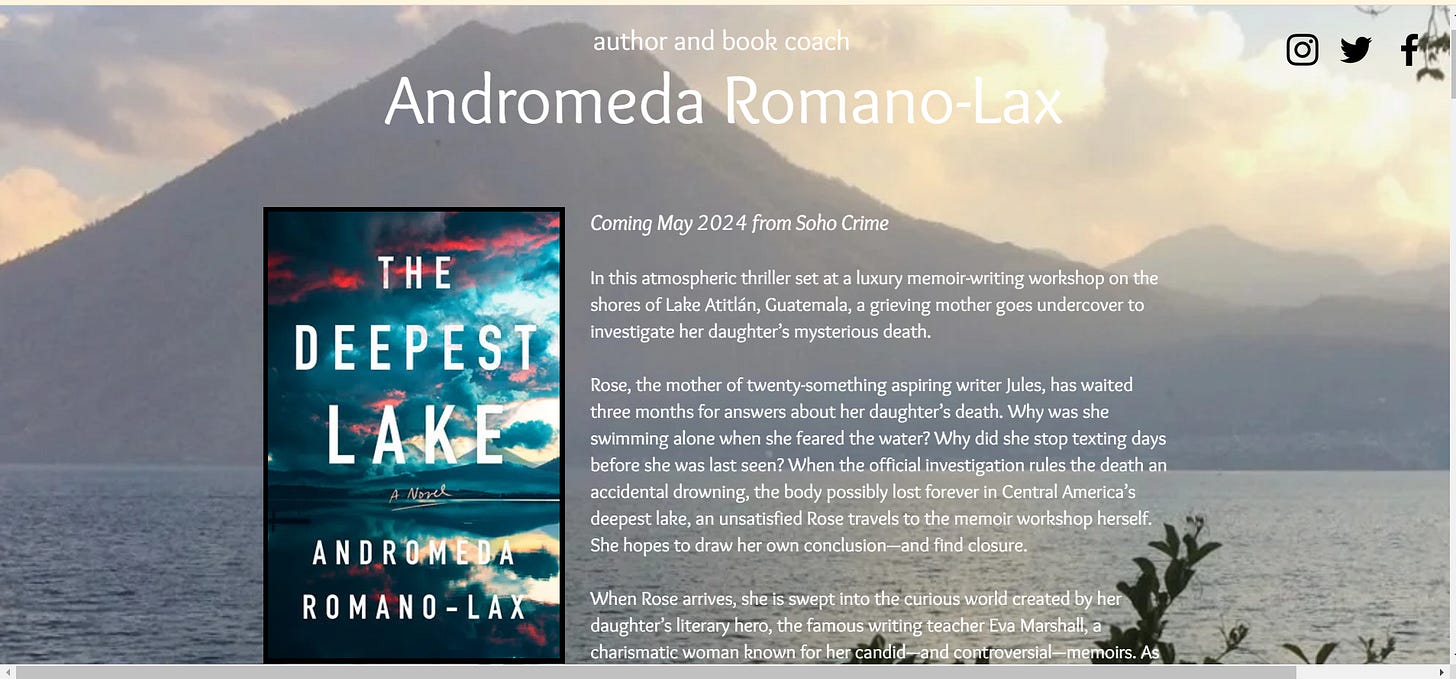
When it comes to websites, the biggest obstacle I’ve seen bedeviling writers is the mistaken belief that a website needs to have lots of bells of whistles and lots of content. That might have been the case many years ago. It isn’t the case now.
Because there are so many other ways to reach and learn about writers online, people searching for websites don’t expect endless features. Many of you will already know that you can link a lot of your content (essays, blogposts, other smaller published pieces) to a Linktree that is displayed on your social media, for example. (Here’s my Linktree, linked to my Instagram, if you want to see what I’ve casually used it for.)
Simply put, your website is your calling card. It can be simple and still function effectively. You can also start simple and add more content later—but really, it’s not essential. Readers don’t google websites like they used to. (Interviewers often do, however, so use the website as the place to control your messaging, if this applies to you and your projects.)
As someone who gets nerdy about analytics, I have lots of opinions about websites and social media. Feel free to ask!
Are you planning to fix up your website or tackle some other writerly chore—or writerly/readerly pleasure—as part of your New Year’s resolutions? I’d love to hear.
BOOK COACHING AND DEVELOPMENTAL EDITING: BOOKING NOW FOR 2024. Coupon!
It’s that time of year when I start setting up my next-year’s-calendar, and clients who book a full manuscript developmental edit before the end of the year will get a 20% discount. Read about my selective services here. I’m happy to answer questions by email.
The ghost of that first failed sophomore novel can still be found online, because a French publisher paid an advance for it. Ouch! I’m not going to provide the link that shows bookstores still “stocking” a novel (cost, 21 euros) that doesn’t exist. Will I ever resurrect the novel? Probably not. C’est la vie. By the way, I put this footnote here only for the sophomore novelists (hands up!) in the audience, because when you are working on your own second novel you want to snuggle within the soppy wrecks of others’ second novel disasters. I know I did. The tale of Michael Chabon’s second-novel attempt—1500 pages, titled Fountain City and never published— was equaled only by the tales of Mark Salzman, who chronicles his many years of writer’s block in a touching memoir called The Man in the Empty Boat. What I learned from those stories. Just…keep…going.
In 2008, I loved that Tony Stark as played by Robert Downey Jr. was such a combination of flaws and rebellious, hard-working determination. I was determined, after my first novel came out, not to be put into a box, and not to give up, either. And I’m happy to say that 15 years later, I still don’t fit! But I am on the verge of selling another novel, which will be #7. So take that, you silly boxes and you even sillier box-makers!




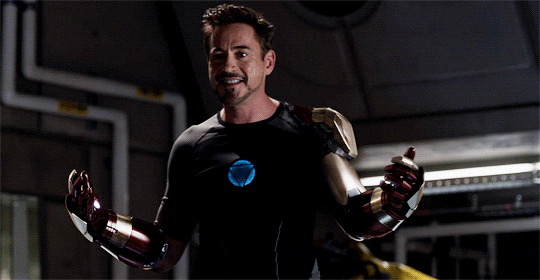

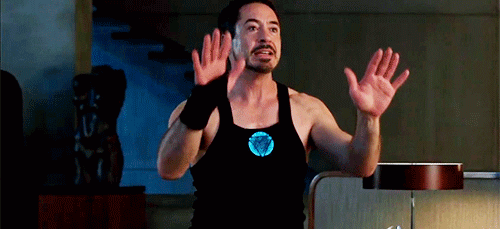
Fantastic, Andromeda!! I’ve followed your journey and recall the disappointments and challenges. Your tenacity is inspiring! Woot!
Selfishly, thank you for the sophomore novel footnote. You know how much I need it! And more importantly, the Iron Man, I really am in awe of you!! Every time I remember it I’m just like “how does a human body do that?? How did SOMEONE I KNOW DO THAT?!!??” You’re amazing!